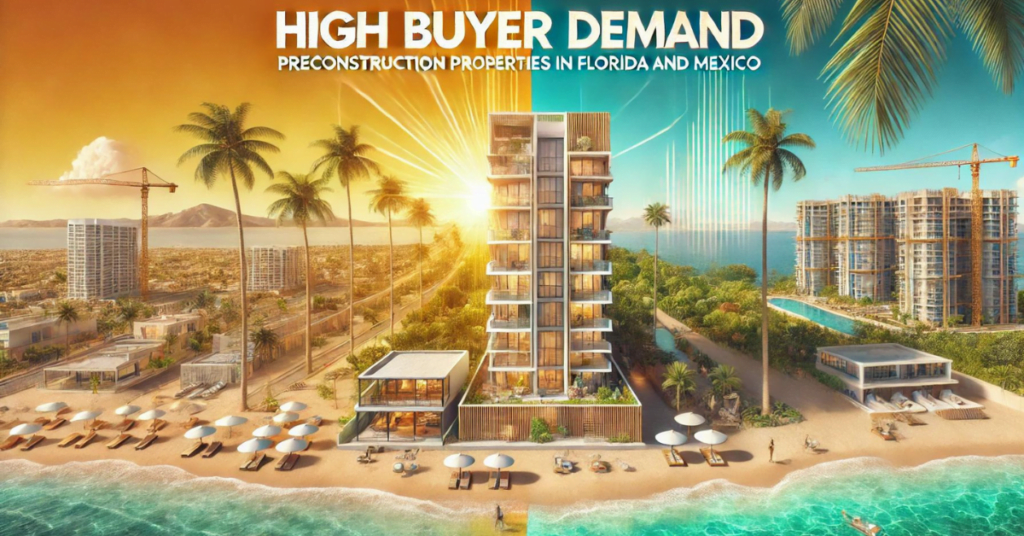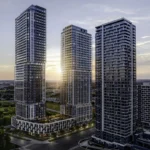Introduction – Preconstruction Properties in Florida and Mexico
In recent years, the real estate market has witnessed a significant surge in demand for preconstruction properties, particularly in tourist-heavy regions such as Florida and Mexico. These locations are not only known for their breathtaking scenery and vibrant culture but also for their promising investment potential. Preconstruction properties in these areas are being snapped up quickly by investors and homebuyers alike, who are keen to capitalize on the anticipated appreciation in value. But what exactly is driving this trend? Let’s delve deeper into the factors contributing to the high buyer demand for preconstruction properties in these sought-after destinations.
Understanding Preconstruction Properties
What Are Preconstruction Properties?
Preconstruction properties refer to real estate that is available for purchase before the construction is completed—or in some cases, before it has even begun. Buyers are essentially purchasing a blueprint and a promise, with the expectation that the property will be delivered according to the plans.
Why Buy Preconstruction?
The allure of preconstruction properties lies in the potential for lower initial prices, customization options, and the opportunity for significant appreciation in value once the property is completed. For investors, these factors combined make preconstruction properties an attractive option for generating returns.
The Appeal of Florida for Preconstruction Buyers
Florida’s Growing Popularity
Preconstruction properties in tourist destinations – Florida has long been a magnet for tourists and retirees alike, drawn by its warm climate, beautiful beaches, and diverse attractions. The state’s population continues to grow, driven by both domestic and international migration, which in turn fuels the real estate market.
Key Locations in Florida
Popular destinations like Miami, Orlando, and Tampa are at the forefront of the preconstruction boom. Miami, for instance, is renowned for its luxurious condominiums, many of which are sold out even before they are built.
Investment Potential
The potential for property appreciation in Florida is one of the key factors driving demand. With a steady influx of new residents and a thriving tourism industry, property values are expected to rise, offering substantial returns for those who invest early.
Mexico: A Hotspot for Preconstruction Properties
The Mexican Real Estate Boom
Preconstruction properties in tourist destinations – Mexico has emerged as a top destination for international property investors, particularly in regions like the Riviera Maya, Puerto Vallarta, and Los Cabos. The combination of affordable prices, stunning natural landscapes, and a growing expat community makes Mexico an appealing choice.
Key Investment Areas in Mexico
The Riviera Maya, which includes popular spots like Playa del Carmen and Tulum, is particularly favored by investors. These areas are not only beautiful but also boast a robust infrastructure, making them ideal for both short-term rentals and long-term investments.
Benefits of Investing in Mexico
Investors in Mexican preconstruction properties can benefit from lower purchase prices compared to similar properties in the United States or Europe, coupled with high rental yields. The growing tourism industry further enhances the potential for property value appreciation.
Factors Driving High Demand for Preconstruction Properties
Anticipated Value Appreciation
One of the primary drivers of demand for preconstruction properties is the expectation of significant value appreciation. Buyers are betting that by the time the property is completed. In addition, its market value will have increased, allowing them to either sell at a profit or enjoy a home that has already gained in worth.
Affordability and Financing Options
Preconstruction properties often come with flexible payment plans, making them more accessible to a broader range of buyers. Developers may offer incentives such as lower down payments or the ability to spread payments over the construction period, which can be particularly attractive to investors looking to maximize cash flow.
Customization Opportunities
Unlike buying an existing property, preconstruction buyers often have the chance to customize aspects of their new home, from floor plans to finishes. This personalization is a significant draw for those looking to create their ideal living space or a unique rental property.
Risks and Considerations
Market Fluctuations
The real estate market is subject to fluctuations, and preconstruction properties are not immune to these changes. Economic downturns, changes in interest rates, or shifts in local market conditions can all impact property values. This can affect the anticipated returns on investment, potentially leading to lower profits or even losses.
To mitigate the risks associated with market fluctuations:
- Diversify your investments: Don’t put all your eggs in one basket. Consider investing in other asset classes, such as stocks or bonds, to balance your portfolio.
- Stay informed: Keep up-to-date with economic news and market trends to anticipate potential fluctuations.
- Consult with a financial advisor: A financial advisor can provide personalized advice based on your risk tolerance and investment goals.
Construction Delays
One of the risks associated with preconstruction properties is the possibility of construction delays. These delays can occur due to various factors, including:
- Financing issues: If the developer has trouble securing financing, it can delay construction.
- Regulatory approvals: Obtaining necessary permits and approvals can take time.
- Labor shortages: A shortage of skilled workers can slow down the construction process.
- Supply chain disruptions: Issues with the supply of materials can cause delays.
To minimize the impact of construction delays:
- Review the developer’s track record: Choose a developer with a history of completing projects on time and within budget.
- Inquire about contingency plans: Ask the developer what their plans are for dealing with potential delays.
- Consider a liquidated damages clause: This clause can specify a penalty that the developer must pay if the project is not completed on time.
Legal and Regulatory Concerns
When investing in preconstruction properties, particularly in foreign countries like Mexico, it’s crucial to be aware of the legal and regulatory landscape. Failure to comply with local laws and regulations can lead to legal complications and financial losses.
To mitigate legal and regulatory risks:
- Work with reputable developers: Choose developers with a proven track record of compliance with local laws.
- Consult with a legal expert: A local attorney can provide guidance on legal matters and help ensure that all necessary documentation is in place.
- Understand local property laws: Familiarize yourself with the property laws in the jurisdiction where you are investing.
- Consider title insurance: This can protect you against potential title defects or claims.
How to Navigate the Preconstruction Market
Research the Developer
Before committing to a preconstruction property, it’s vital to research the developer’s track record. Look for developers with a history of delivering projects on time and within budget.
Understand the Market
Investors should take the time to understand the local real estate market, including trends in property values, rental demand, and potential risks. This knowledge can help make informed decisions and identify the best investment opportunities.
Work with Local Experts
Partnering with local real estate agents and legal advisors who are familiar with the preconstruction market is essential for navigating the complexities of purchasing property in a foreign country like Florida or Mexico. Here are some key reasons why:
- Market Knowledge: Local experts have a deep understanding of the local real estate market, including trends, regulations, and potential risks.
- Network Connections: They can connect you with reputable developers, contractors, and other professionals who can assist with the purchase process.
- Language Barrier: If you don’t speak the local language, a local agent can help communicate with sellers, developers, and other parties involved in the transaction.
- Negotiation Skills: Local experts can help negotiate the best possible price and terms for your preconstruction property.
- Cultural Nuances: They can guide you through cultural nuances and customs that may be unfamiliar to you.
Choosing the Right Experts:
- Referrals: Ask friends, family, or colleagues for recommendations.
- Online Reviews: Read reviews of local real estate agents and legal advisors.
- Interviews: Interview potential candidates to assess their expertise and compatibility.
Continued Growth in Demand
The demand for preconstruction properties in Florida and Mexico is expected to continue rising due to several factors:
- Population Growth: Both Florida and Mexico are experiencing significant population growth, driven by factors such as job opportunities, affordability, and lifestyle preferences.
- Tourism: These destinations are popular tourist destinations, attracting visitors from around the world. This tourism can lead to increased demand for short-term rentals and vacation homes.
- Retirement: Florida and Mexico are also popular retirement destinations, attracting retirees seeking a warmer climate and lower cost of living.
- Economic Development: Both countries are experiencing economic growth, which can lead to increased investment in real estate.
- Lifestyle Preferences: Many people are drawn to the lifestyle benefits of living in Florida or Mexico, such as beautiful beaches, warm weather, and outdoor activities.
Innovation in Property Development
Developers in Florida and Mexico are increasingly incorporating innovative designs and sustainable practices into their preconstruction projects to meet the evolving demands of buyers. Some examples of these innovations include:
- Smart Home Technology: Incorporating smart home features like voice control, automated lighting, and security systems.
- Sustainable Design: Using eco-friendly materials, energy-efficient appliances, and sustainable construction practices.
- Amenities: Offering a wide range of amenities, such as swimming pools, fitness centers, spas, and concierge services.
- Unique Architectural Styles: Incorporating unique architectural styles and designs that reflect the local culture and environment.
- Co-Living Spaces: Developing shared living spaces that offer affordable housing options for young professionals and students.
Impact of Technological Advancements
Technology is playing a significant role in the preconstruction market, particularly in the way properties are marketed and sold. Some examples of technological advancements include:
- Virtual Reality Tours: Allowing buyers to virtually tour properties before they are built.
- Drone Footage: Providing aerial views of properties and surrounding areas.
- Interactive Floor Plans: Allowing buyers to explore floor plans in detail and customize features.
- Online Platforms: Offering online platforms for buying and selling preconstruction properties.
- Digital Contracts: Using electronic signatures and digital documentation to streamline the purchase process.
Potential Challenges and Considerations
While the outlook for preconstruction properties in Florida and Mexico is generally positive, potential challenges remain:
- Construction Costs: Rising construction costs, driven by factors such as labor shortages and supply chain issues, could impact the profitability of new developments.
- Regulatory Changes: Changes in local regulations, particularly those related to environmental protection or zoning, could affect the development process.
- Economic Fluctuations: Economic downturns or fluctuations in the global economy could impact property values and demand.
- Legal Complexities: Purchasing property in a foreign country can involve legal complexities, such as understanding local property laws and ensuring that all necessary documentation is in place.
- Market Saturation: In some areas, the market may become saturated with preconstruction projects, leading to increased competition and potentially lower returns for investors.
Conclusion
The high demand for preconstruction properties in tourist destinations like Florida and Mexico is driven by a confluence of factors. These include the potential for significant value appreciation, the appeal of customizable living spaces, and the allure of owning property in some of the world’s most desirable locations. As more people seek out these opportunities, both markets are likely to see continued growth, with developers responding by offering increasingly innovative and attractive projects.
However, potential buyers must approach these investments with careful consideration, understanding the risks involved and working with experienced professionals to navigate the complexities of the preconstruction market. For those who do their due diligence, the rewards of investing in preconstruction properties in these regions can be substantial.
Key Takeaways:
- Market Dynamics: The preconstruction market in Florida and Mexico is driven by factors such as population growth, tourism, and economic development.
- Investment Potential: Preconstruction properties offer the potential for significant value appreciation and customization options.
- Risks and Considerations: Potential buyers should be aware of risks like construction delays, market fluctuations, and legal complexities.
- Due Diligence: Conducting thorough research and working with experienced professionals is crucial for successful preconstruction investments.
- Future Outlook: The demand for preconstruction properties in these regions is expected to continue growing, driven by factors like population growth and economic development.
Additional Considerations:
- Emerging Trends: Keep an eye on emerging trends in the preconstruction market, such as sustainable development, smart home technology, and co-living spaces.
- Local Regulations: Understand the local regulations and zoning laws that may impact preconstruction projects.
- Economic Indicators: Monitor economic indicators, such as GDP growth, interest rates, and employment rates, as they can influence the real estate market.
- Lifestyle Factors: Consider your personal lifestyle preferences and needs when choosing a preconstruction property.
By carefully considering these factors and conducting thorough due diligence, potential buyers can make informed decisions and maximize their investment potential in preconstruction properties in Florida and Mexico.
Discover the latest trends in luxury Miami condos at Brickell Sold, and explore professional real estate photography services in Toronto with Click Media Pro. For comprehensive updates on Canadian real estate developments, visit Wedu and the Wedu Blog. Stay informed about the pre-construction market by visiting Preconstruction Info.
FAQs
1. What are the benefits of buying a preconstruction property?
Preconstruction Properties in Florida & Mexico often come at a lower initial price, offer customization options, and have the potential for significant value appreciation by the time construction is completed.
2. What are the risks associated with preconstruction properties?
Risks include construction delays, market fluctuations that could affect property values, and legal complexities. Especially when purchasing in a foreign country like Mexico.
3. How can I ensure my investment in a preconstruction property is safe?
To safeguard your investment, research the developer’s track record, understand the local market, and work with experienced real estate and legal professionals who are familiar with preconstruction projects.
4. Why are Florida and Mexico popular destinations for preconstruction properties?
Both Florida and Mexico offer beautiful locations, strong tourism appeal, and the potential for property value appreciation. This making them attractive markets for preconstruction investments.
5. Can foreign buyers purchase preconstruction properties in Mexico?
Yes, foreign buyers can purchase preconstruction properties in Mexico. But it’s essential to understand the legal requirements and work with a reputable real estate agent. And also legal advisor to ensure a smooth transaction.
6. What are the typical payment plans for preconstruction properties?
Payment plans can vary, but common options include:
- Down payment: A percentage of the total purchase price paid upfront.
- Milestone payments: Payments made at specific stages of construction, such as when the foundation is completed or when the building reaches a certain height.
- Financing options: Developers may offer financing options, such as in-house financing or partnerships with lenders.
7. How long does it typically take for a preconstruction project to be completed?
Construction timelines can vary depending on factors like the size of the project, local regulations, and the developer’s experience. However, it’s generally expected that preconstruction projects in Florida and Mexico can take anywhere from 1 to 3 years to complete.
8. Can I rent out my preconstruction property once it’s completed?
Yes, you can rent out your preconstruction property once it’s completed. In fact, many investors purchase preconstruction properties with the intention of renting them out for short-term or long-term rentals.
9. What are the tax implications of owning a preconstruction property?
Tax implications can vary depending on your individual circumstances and the specific laws in Florida or Mexico. It’s essential to consult with a tax professional to understand the tax implications of owning a preconstruction property.
10. How can I stay updated on the progress of my preconstruction project?
Developers typically provide updates to buyers throughout the construction process. These updates might include:
- Regular communication: Emails, phone calls, or in-person meetings.
- Construction updates: Photos, videos, or site visits.
- Project timelines: Updates on the expected completion date.






